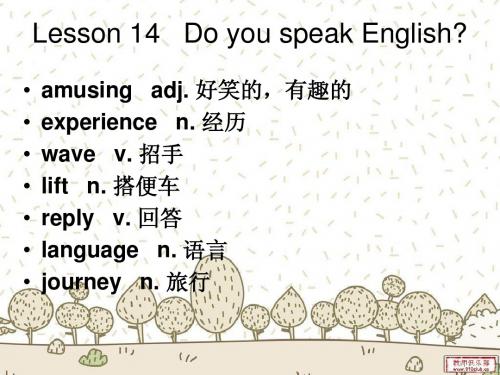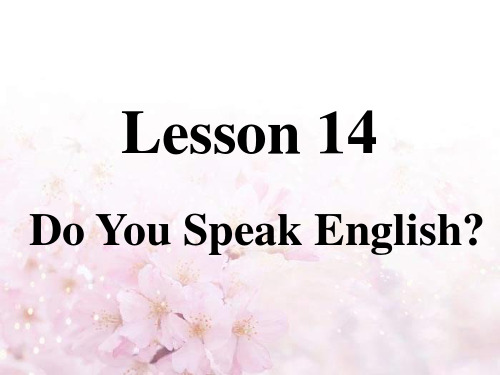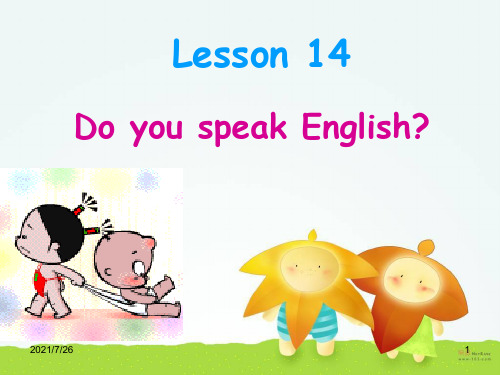新概念2Lesson14Do you speak English 课件
合集下载
新概念第二册PPT教学笔记Lesson 14 Do you speak English

• Except, Except for 与 Apart from 和 besides,but. • 三者都表示“除……以外”,但except不用于 句首,except for 和 apart from则可以。 • • Everyone has helped in some way apart from/except for/except you. • Apart from/Except for you, everyone has helped in some way.
• • • •
★reply v. 回答 reply与answer的区别: answer sth. answer the letter
• reply to sth.
• ★journey n. 旅行 • journey n. (通常指长时间的陆地旅行)
• trip
n. (短距离旅行或出差)
• 【Text】 • I had an amusing experience last year. After I had left a small village in the south of France, I drove on to the • next town. On the way, a young man waved to me. I stopped and he asked me for a lift. As soon as he had • got into the car, I said good morning to him in French and he replied in the same language. Apart from a few • words, I do not know any French at all. Neither of us spoke during the journey. I had nearly reached the town, when the young man suddenly said, very slowly, ‘Do you speak English?' As I soon learnt, he was English himself!'
新概念英语第二册Lesson14 Do you speak English(PPT32张)

• Guangdong is பைடு நூலகம்_o_n____ the southeast of Guangxi.
• 2、On the way, a young man waved to me. • on the way 在路上, 在途中
• My mom is on the way to pick me up. • 我妈妈正在来接我的路上。 • on one's way to SP. 在某人去某地的途中 • On my way to school 在我去上学的路上 • On one's way home 在某人回家的路上 • wave to sb. 冲某人挥手
• As soon as I had entered the room,I took off my coat at once.
• As soon as I had received the letter,I ringed/called him back.
• 只要是状语从句, 一旦遇到将来时, 变为一般现在时 • As soon as you arrive,you must call me. 你一到就打我
• 2)vi. (雾、云)消散,(雨、雪)停止
• Eg. The fog has lifted.
• 3) n. 电梯 elevator (Am)
• 4) n. 搭便车 • give sb a lift 让某人搭便车 • take a lift 搭便车 • ask sb for a lift 叫某人顺搭一下车 • Can you _g_ive_ _m_e a__ l_ift_? • I want to _ta_ke _a _l_ift_.
• The amusing story amused the children. • funny adj. 好笑的(不一定要笑出声可以指贬义),
• 2、On the way, a young man waved to me. • on the way 在路上, 在途中
• My mom is on the way to pick me up. • 我妈妈正在来接我的路上。 • on one's way to SP. 在某人去某地的途中 • On my way to school 在我去上学的路上 • On one's way home 在某人回家的路上 • wave to sb. 冲某人挥手
• As soon as I had entered the room,I took off my coat at once.
• As soon as I had received the letter,I ringed/called him back.
• 只要是状语从句, 一旦遇到将来时, 变为一般现在时 • As soon as you arrive,you must call me. 你一到就打我
• 2)vi. (雾、云)消散,(雨、雪)停止
• Eg. The fog has lifted.
• 3) n. 电梯 elevator (Am)
• 4) n. 搭便车 • give sb a lift 让某人搭便车 • take a lift 搭便车 • ask sb for a lift 叫某人顺搭一下车 • Can you _g_ive_ _m_e a__ l_ift_? • I want to _ta_ke _a _l_ift_.
• The amusing story amused the children. • funny adj. 好笑的(不一定要笑出声可以指贬义),
新概念二册Lesson14 (共47张PPT)

除了他我们都去了。
We all went except him.
but = except “除了…以外”,通常用在 every, any, no 等复合词之后。放在句中 。
除I了s汤e姆nt的o信u以t 外e,ve我ry全部m都ai发l 出bu去t了T。im‘s.
except for“除了…以外”,用于表 示对主要部分的肯定和对局部的否定。 可放在句首或句中 。
Except for/Apart from an old lady, the bus was empty.
Besides his father, his mother comes too.
Neither of us spoke during the journey.
neither
of
(两个)中的任何一个都 ……不
I like traveling.
After I had left a small village in the south of France,
I drove on to the next town.
After
在……之后
时间状语从句 过主去语两的个动动作作发前生后在发从生句,动发作生之在后前
面的动作用__过_去__完__成___时
amusement park 游乐园
★ amusing/ amused
好笑的 被逗笑的,感到好笑的
keep sb amused
This is an _a_m_u_s_i_n_g__ film. She was __a_m_u_s_e_d_ by his
jokes.
Playing with water can
as soon as +一句子…(…强就调…两…个动作几乎是连在一起的)
We all went except him.
but = except “除了…以外”,通常用在 every, any, no 等复合词之后。放在句中 。
除I了s汤e姆nt的o信u以t 外e,ve我ry全部m都ai发l 出bu去t了T。im‘s.
except for“除了…以外”,用于表 示对主要部分的肯定和对局部的否定。 可放在句首或句中 。
Except for/Apart from an old lady, the bus was empty.
Besides his father, his mother comes too.
Neither of us spoke during the journey.
neither
of
(两个)中的任何一个都 ……不
I like traveling.
After I had left a small village in the south of France,
I drove on to the next town.
After
在……之后
时间状语从句 过主去语两的个动动作作发前生后在发从生句,动发作生之在后前
面的动作用__过_去__完__成___时
amusement park 游乐园
★ amusing/ amused
好笑的 被逗笑的,感到好笑的
keep sb amused
This is an _a_m_u_s_i_n_g__ film. She was __a_m_u_s_e_d_ by his
jokes.
Playing with water can
as soon as +一句子…(…强就调…两…个动作几乎是连在一起的)
新概念第二册Lesson_14_Do_you_speak_English

shopping.
现在我没有英语书。 I have no English book at present.
2. 全国 all parts of the country
今年夏天,我游览了全国。
This summer, I visit all parts of
the country.
amusing
A the dinner already. _____
A had cooked
B. cooked
C. have cooked
D.
was cooked
2. He _____ to play ____ before he was 11 years old. A had learned, piano C has learned, the piano
when :此时 我刚一回到家,此时就开始下雨了。 e.g.: I had reached home, when it started to
rain.
I had reached home, when it started raining.
reach + 地点
= get to +地点 = arrive at/in +
speak + 语言
说某种语言
Apart from a few words, I do not know any
French at all.
apart from…
除……以外
除了法语,我还懂英语。 e.g.: Apart from French, I also speak English. 除了钱,我一无所有。 e.g.: Apart from money, I have nothing at all.
新概念2 第14课ppt课件

Motto
All things come to those who wait.
Lesson 14
Do you en to the tape
• listen to the tape write down what you heard as much as possible:
I had nearly reached the town, when the young man suddenly said, very slowly, "Do you speak English?' As I soon learnt, he was English himself!'
Motto
go on a trip = go on business
travel n. 周游(长途旅行) tour n. 游玩(为了玩) tourist n. 游客 voyage n. 旅行(海上) flight n. 空中飞行
【Text】
After I had left a small village in the south of France, I drove on to the next town. after引导的从句如果一个是过去时, 一个是过去完成时,那一定是从句用 过去完成时;before引导的从句表 示“在……之前”,主句发生在从句之 前, 主句用过去完成时。
reply v. 回答 reply与answer的区别: ① 作为不及物动词是一样的 :
He answered/replied. ② 作为及物动词就不一样了 :
answer sth. answer the letter 回信
reply to sth. I will reply to the letter.
All things come to those who wait.
Lesson 14
Do you en to the tape
• listen to the tape write down what you heard as much as possible:
I had nearly reached the town, when the young man suddenly said, very slowly, "Do you speak English?' As I soon learnt, he was English himself!'
Motto
go on a trip = go on business
travel n. 周游(长途旅行) tour n. 游玩(为了玩) tourist n. 游客 voyage n. 旅行(海上) flight n. 空中飞行
【Text】
After I had left a small village in the south of France, I drove on to the next town. after引导的从句如果一个是过去时, 一个是过去完成时,那一定是从句用 过去完成时;before引导的从句表 示“在……之前”,主句发生在从句之 前, 主句用过去完成时。
reply v. 回答 reply与answer的区别: ① 作为不及物动词是一样的 :
He answered/replied. ② 作为及物动词就不一样了 :
answer sth. answer the letter 回信
reply to sth. I will reply to the letter.
新概念二标准课件lesson14

had finished (finish) his work he went out. 1. After he ______________
had broken (break) 2. The children ran away after they ___________ the window. had gone (go) out. 3. I went to Tom’s house but he __________ bought 4. My friend __________ (buy) the car two years ago. has had He ________________ (buy) it for two years.
Reply 1)回答 答复 (一般指书面回答) She has replied to my letter reply to a question answer(用语言行为的)回答,答复跟宾 语 answer the telephone
Language 1)语言 spoken language, written language, a foreign language, the second language 2)除了文字以外的传达,人造语言 body language,sign language
用所给动词的正确形式填空.
had turned off 1. He_______________ (turn off) the lights before he left the classroom.
Had had 2. _________ your parents _______(have) lunch when you arrived at home?
新概念英语第2册课件Lesson14(共40页)

▪ Language 1)语言 ▪ speak a language,讲一门语言 ▪ a foreign language, the second language ▪ native language 母语 ▪ The native language is Chinese. ▪ mother tongue 母语(口语中用) ▪ My mother tongue is Chinese. ▪ 2)除了文字以外的传达,人造语言 ▪ body language,sign language
this job. (经验,不可数名词) ▪ Does she have any experience in teaching? ▪ ③ vt. 经验,体验 ▪ Have you ever experienced anything like this? ▪ The village has experienced great changes
Because of them thought the other was French and both of them knew little French.
Key Words and Expressions
amusing
a. 有趣的
experience
n. 经验,体验
wave
v. 挥手
ask sb. for a lift 要求搭车
▪ ★experience n. 经历(可数);经验(不可数) ▪ ① n. 经历(可数) ▪ He has a lot of experiences. (经历,可数名词) ▪ ② n. 经验,体验(不可数) ▪ They want someone with a lot of experience for
新概念英语第二册Lesson14共41页课件

2021/7/26
23
7. -Have you ever______Lintong to see the Terra Cotta Warriors?
-Yes, I have. • went to B. gone to C. been in D. been to 8. My parents ______ Shangdong for ten years. • have been in B. have been to C. have gone to D. have
9
By the end of……
2006
2011
learn 4000 English words
By the end of 2006, I had 2021/7/26 learned 4000 new words. 10
The Past Perfect Tense 过去完成时
• 过去完成时的构成
By the time the policeman got to the shop, Tom had run away.
2021/7/26
7
Speaking--freely : By the time… or
When…
the concert be over Liu Mei wake up
By the time Liu Mei woke up,
2.a.I ran outside to the bus stop. The bus was gone. b. By the time I ran outside to the bus stop, the bus had already gone.
3.a.I got home. I realized that my homework was still at school. b. When I got home,I realized that I had left my homework at school.
新概念英语NCE2_Lesson14(共41页)课件

• to the south of …
• 以南(隔海相望)
• 2) adj. 南面的
•
• the south gate of a school 学校的南大门
12
• France
•
• 1) France [fræ ns] n.法兰西,法国
• 2) n. 经验 [U]
• 他没有足够的工作经验。
•
Байду номын сангаас
• He hasn't had enough work experience.
• 我从经验得出,他一定会迟到的。
• I know from experience that he will arrive late.
• 3) v. 经历,感受
•
• Experience happiness and bitterness together.
Did the young man speak English?
2. Read after the tape. Pay attention to the pronunciation and intonation.
4
I had an amusing experience last year.
✓ amusing a. 滑稽的,好笑的,有趣的 amused: 感到好笑的 amuse v. Make sb. Laugh or smile amusement n. The story is amusing.
experienced doctor.
7
• experience [iks'piəriəns] • 1) n. 经历,阅历 [C]
•
• an amusing experience • 一次好笑的经历
新概念第二册第 14课时

Hawaii
France
reply v.回答
reply与answer的区别: ① 作为不及物动词是一样的 :
He answered/replied. ② 作为及物动词就不一样了 :
answer sth. answer the letter 回信
reply to sth. I will reply to the letter. 回信
★ lift n. 搭便车
take a lift. 搭便车 我想要搭便车
I want to take a lift. take a bus/taxi 乘公共汽车/乘出租汽车
give sb. a lift. 让某人搭便车 学生让我搭便车
The student gave me a lift. 在国外如何搭便车,你知道吗?
language n. 语言(不可数)
native language 母语 我们的母语是汉语。
The native language is Chinese. mother tongue 母语(口语中用)
我们的母语是汉语。 My mother tongue is Chinese.
journey n. 旅行
Lesson 14 Do you speak English ?
New words and expressions 生词和短语
amusing adj 好笑的,有趣的
这个故事很好笑 The story is amusing. amused adj. 感到好笑的(要笑出声) 这个故事让我感到好笑 The story amused me. funny adj. 好笑的(不一定要笑出声可以 指贬义),开心的,令人开心的
journey n. 所有的旅行,偏重于陆地旅行 go on a journey 去旅行
- 1、下载文档前请自行甄别文档内容的完整性,平台不提供额外的编辑、内容补充、找答案等附加服务。
- 2、"仅部分预览"的文档,不可在线预览部分如存在完整性等问题,可反馈申请退款(可完整预览的文档不适用该条件!)。
- 3、如文档侵犯您的权益,请联系客服反馈,我们会尽快为您处理(人工客服工作时间:9:00-18:30)。
interesting / funny story
★experience n. 经历(可数);经验(不可数) ① n. 经历(可数)
He has a lot of experiences. (经历,可数名词) ② n. 经验,体验(不可数) Does she have any experience in teaching? (经验,不可数名词) ③ vt. 经验,体验
3. Why did neither of them speak during the journey?
Passage analysisence last year. amusing adj. 好笑的, 有趣的 experience nc. 经历: 可数名词 experience nu. 经验 : 不可数名词
【New words and expressions】
amusing [ə'mju:ziŋ] adj. 好笑的,有趣的 experience [iks'piəriəns] n. 经历 wave [weiv] v. 招手
lift [lift]
n. 搭便车
reply [ri'plai] v. 回答 language ['læ ŋɡwidʒ] n. 语言 journey ['dʒə:ni] n. 旅行
【New words and expressions】
★amusing adj. 好笑的, 有趣的 The story is amusing.这故事很好笑 amused adj. 感到好笑的(要笑出声) I am amused.我感到很开心。 amuse v. 使发笑,使愉快 The story amused me. funny adj. 好笑的(不一定要笑出声 可以指贬义),开心的,令人开心的
travel n. 周游(长途旅行) tour n. 游玩(为了玩) tourist n. 游客 voyage n. 旅行(海上) flight n. 空中飞行
Listen & Answer
1. What happened when the writer was driving to a town in France?
1. Describe the various ways you are able to recognize a foreigner in your country. 2.Have you ever tried to talk to someone who didn't know your language? What happened?
A young man waved to the writer and
asked for a lift.
2. In which language did the young man reply to the writer’s greeting?
He replied in French.
Because both of them thought the other was French and both of them knew little French.
★reply v. 回答 reply与answer的区别: ① answer作为不及物动词是一样的 : He answered/replied. ② answer作为及物动词就不一样了 : answer sth. answer the letter 回信 reply to sth. I will reply to the letter. 回信 ★language n. 语言 native language 母语 The native language is Chinese. mother tongue 母语(口语中用) My mother tongue is Chinese.
Have you ever experienced anything like this? experienced adj. 有经验的,经验丰富的 He is an experienced doctor.
★wave v. 招手 wave to sb. 向某人招手 ★lift n. 搭便车 take a bus/taxi/lift 乘公共汽车/乘出 租汽车/搭便车 B wants to take a lift. 某人想搭便 车 I want to take a lift. A give B a lift. 让某人搭便车 The student gave me a lift. thumb lift 拇指便车(向过路车辆竖 起拇指表示要求免费搭车)
1、After I had left a small village in the south of France, I drove on to the next town. 如果,主句和从句的两个动作都发生在过去: (1)两个动作同时发生,用过去进行时. (2)两个动作一前一后,发生在前的动作用过 去完成时。 I was reading when my friend called. 我朋友来看我时我正在看书。 After he had gone, I went on to read. 他走了以后我便继续看书。 drive on 继续开往,副词on紧跟在动词后面时 可以表示“向前”、“继续下去”等意义: He talked on until everybody had gone. 他 滔滔不绝地讲到大家都走了。 drive to 开车去某地
Lesson 14 Do you speak English ?
Warm-up questions
1. What do you think is happening in the picture? 2. Do they talk with each other? And why?
Topics for discussion
★journey n. 旅行 journey n. 所有的旅行,偏重于陆地旅行 go on a journey 2 hours„ journey; 3 days' journey(三天路程) trip n. 短距离旅行或出差(时间或距离上较 短) go on a trip = go on business
